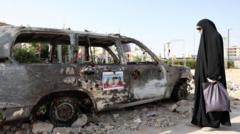**As U.S. and Iran engage in military actions, Qatar navigates complex diplomacy to broker a fragile cease-fire.**
**Qatar's Diplomatic Maneuvering: A Path to Peace in the Israel-Iran Conflict**

**Qatar's Diplomatic Maneuvering: A Path to Peace in the Israel-Iran Conflict**
**Qatar Takes Center Stage in Mediating Cease-Fire Amid Rising Tensions**
In a remarkable display of diplomacy, Qatar has stepped into the spotlight as a critical mediator between Israel and Iran amid escalating tensions and military actions. Prime Minister Sheikh Mohammed bin Abdulrahman al-Thani has played a pivotal role in brokering a much-needed cease-fire following Iran's missile assault on a U.S. military base located in Qatar's desert outskirts.
Prior to the midnight deadline, officials within the Qatari government called upon reporters to express their stance against the missile barrage launched from Iran, reaffirming Qatar's right to defend itself. Majed al-Ansari, spokesman for the foreign ministry, voiced a call for de-escalation and the urgency of cease-fire talks, despite emphasizing the nation's right to retaliate.
Interestingly, while publicly denouncing the missile attack, Qatar was also quietly working behind the curtains to initiate discussions aimed at reconciliation, reaching out to both Israel's American allies and the Iranian government. Sanam Vakil, director of the Middle East and North Africa Program at Chatham House, noted how Qatar's actions illustrate a blend of resilience and pragmatic diplomacy in the face of dangerous provocations.
The situation escalated dramatically when the United States retaliated against Iran by targeting its nuclear facilities. This prompted Iran's attack on the Al Udeid aid base in Qatar, which was largely thwarted due to prior intelligence about the impending strike, as stated by Maj. Gen. Shayeq Misfer al-Hajri, deputy chief of staff for Qatar's joint operations.
By navigating the treacherous waters of international relations, Qatar seeks not only to protect its sovereignty but also aims to facilitate dialogues that could lead to peace in the volatile region.
Prior to the midnight deadline, officials within the Qatari government called upon reporters to express their stance against the missile barrage launched from Iran, reaffirming Qatar's right to defend itself. Majed al-Ansari, spokesman for the foreign ministry, voiced a call for de-escalation and the urgency of cease-fire talks, despite emphasizing the nation's right to retaliate.
Interestingly, while publicly denouncing the missile attack, Qatar was also quietly working behind the curtains to initiate discussions aimed at reconciliation, reaching out to both Israel's American allies and the Iranian government. Sanam Vakil, director of the Middle East and North Africa Program at Chatham House, noted how Qatar's actions illustrate a blend of resilience and pragmatic diplomacy in the face of dangerous provocations.
The situation escalated dramatically when the United States retaliated against Iran by targeting its nuclear facilities. This prompted Iran's attack on the Al Udeid aid base in Qatar, which was largely thwarted due to prior intelligence about the impending strike, as stated by Maj. Gen. Shayeq Misfer al-Hajri, deputy chief of staff for Qatar's joint operations.
By navigating the treacherous waters of international relations, Qatar seeks not only to protect its sovereignty but also aims to facilitate dialogues that could lead to peace in the volatile region.























